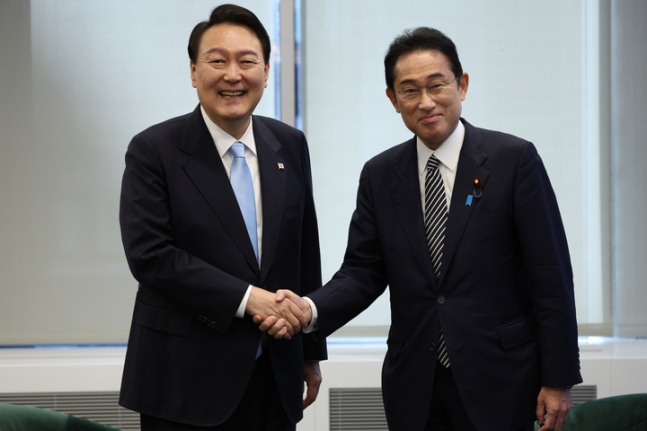Yoon talks with Kishida over security against NK provocations
By Shin Ji-hyePublished : Oct. 6, 2022 - 15:13

President Yoon Suk-yeol discussed security issues related to North Korea’s successive ballistic missile provocations in a phone call with Japanese Prime Minister Fumio Kishida early Thursday evening.
“President Yook Suk-yeol had a 25-minute phone call with Japanese Prime Minister Fumio Kishida about the recent North Korean ballistic missile launch from 5:35 to 6:00 p.m. on Thursday,” the presidential office said in a written statement following the talks.
“The two leaders strongly condemned North Korea's ballistic missile launch as a serious and grave provocation threatening peace and security on the Korean Peninsula as well as Northeast Asia and the international community, and agreed to cooperate so that South Korea and Japan can respond strictly to North Korea,” the office said in the statement.
The two leaders shared the view that North Korea's reckless provocations must be stopped, and that it is necessary to accurately convey the message that provocations come at a cost, the statement added.
“To this end, they said that it is important not only for the trilateral security cooperation between South Korea, the US and Japan, but also for firm solidarity with the international community, including the United Nations Security Council.”
The two leaders agreed that Korea and Japan are partners for cooperation on various pending issues in the international community, and agreed to continue their diplomatic efforts, evaluating that there is a positive trend in bilateral relations, including last month's UN General Assembly.
Following North Korea's consecutive ballistic missile launches, the international community, including the US and Japan, has leveled criticism and strengthened security cooperation to enhance deterrence against the North.
North Korea's Thursday firing was the sixth round in 12 days, working out to missile launches once every two days. It was the 10th round of missile launches since the inauguration of the Yoon Suk-yeol government. As of this year, North Korea has launched ballistic missiles 22 times, and cruise missiles twice.
North Korea's provocations and other security issues were likely to be discussed in the talks with Kishida, Yoon had told reporters earlier in the day ahead of their meeting.
“It is not known exactly what will be the subject of our conversation with Prime Minister Kishida," Yoon said. “Japan seems to be in a big mess because of the IRBM (intermediate-range ballistic missile), which passed through the Japanese archipelago the day before yesterday, and I expect (we could) talk about security issues."
Shortly after the North's provocation earlier in the day, Kishida met with reporters at the prime minister's residence and said North Korea's ballistic missile launches cannot be tolerated, according to Japanese media, including NHK and Kyodo News.
He instructed officials to provide the public with quick and accurate information by concentrating on collecting and analyzing information related to North Korean missiles, the media outlets reported.
The North's provocations also led to an unusually straightforward statement from the White House. On Monday, a White House statement condemned North Korea's launch of an intermediate-range ballistic missile. It was the second time the White House directly condemned North Korea's missile launches since US President Joe Biden took office.
The White House said the US strongly condemns North Korea’s "dangerous and reckless" decision to launch a long-range ballistic missile over Japan. “This action is destabilizing and shows the DPRK’s blatant disregard for United Nations Security Council resolutions and international safety norms.” DPRK refers to the North's official name, the Democratic People's Republic of Korea.
Separately, Yoon, citing Kishida's speech at the Japanese National Assembly on Monday, also had hoped to discuss normalization between the two neighboring nations.
Calling it a "fairly forward-looking statement" toward South Korea, and taking into account the opinions of the government and people of Japan, Yoon had said it was possible the issue would be on the agenda.
Kishida, in the speech, defined South Korea as an important neighboring country that should cooperate in responding to the various challenges of the international community and that the government would communicate closely with the South Korean government.
However, historical issues between South Korea and Japan were not expected to be discussed in depth.
Japanese news reports, citing several government officials, said although the leaders of South Korea and Japan had already spoken in June and last month, the Japanese side remained cautious. The reports said the phone call could also be limited to discussing the North Korean provocations, without touching on the issue of conscripted workers.



















![[Today’s K-pop] Treasure to publish magazine for debut anniversary](http://res.heraldm.com/phpwas/restmb_idxmake.php?idx=642&simg=/content/image/2024/07/26/20240726050551_0.jpg&u=)